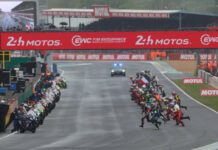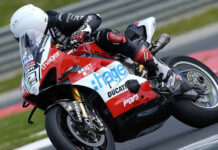FIM Grand Prix World Championship
Decision of the Grand Prix Commission
The Grand Prix Commission, composed of Messrs. Carmelo Ezpeleta (Dorna, Chairman), Ignacio Verneda (FIM CEO), Herve Poncharal (IRTA) and Takanao Tsubouchi (MSMA) in the presence of Javier Alonso (Dorna) and Mike Trimby (IRTA, Secretary of the meeting), in a meeting held on 10th of December 2015 in Madrid, made the following decisions:
Sporting Regulations
Effective Immediately
Re-Starting Interrupted Races
In order to minimise the time taken to restart an interrupted race a new procedure has been approved for all classes. This will involve a shorter time spent in the pit lane before the new sighting lap and a significantly shorter countdown on the grid prior to the warm up lap. (Engines will not be stopped and only one mechanic per rider will be permitted onto the grid).
In the Moto3 and Moto2 classes when there is more than one race interruption the length of the restarted race will always be 2/3 of the previous race, with a minimum of five laps. So, for example, if the first restarted race was 2/3 of the original race distance then the distance of the second restarted race would be 2/3 of that distance – always with a minimum of five laps. In situations where a restarted race has been interrupted after less than five laps then the distance for the next race will be determined by Race Direction with a minimum of five laps.
Track Familiarisation
For all classes the regulations have been amended to ensure that when a rider uses a machine of the same capacity as the relevant MotoGP class, this can only be a standard production road homologated machine.
Penalties for Using Engines over Allocation
In the Moto3 and MotoGP classes, where more than one extra engine is taken at a single event then penalties for the second and any subsequent extra engines will be carried forward to the next event(s).
Technical Regulations
Effective Immediately
Rider’s Safety Equipment
Following consultation with all major suppliers of helmets, leathers, boots, etc., new regulations have been approved covering the specifications of equipment used by riders. Procedures for control and testing were also approved.
MotoGP Class Tyres
In line with the appointment of Michelin as the Official Tyre Supplier, the allocations of slick tyres have been modified. Riders will now be permitted to use a maximum of 22 tyres (10 front and 12 rear). For wet tyres the allocation is a maximum of 7 front and 7 rear. Riders will now also have the option of an intermediate tyre with a maximum allocation of 3 front and 3 rear.
Engine Allocations – MotoGP Class
It has already been agreed that manufacturers can homologate three different engine specifications which may be used by different riders during the season. It has now been agreed that manufacturers who lose “concessions” may homologate additional engine specifications for the first season after losing those concessions. However, the maximum number of different specifications is related to the number of Satellite teams being supplied. The formula to be used to calculate this number is:
One Factory team + 2 Satellite teams = 3 different specifications
One Factory team + 3 Satellite teams = 4 different specifications
One Factory team + 4 Satellite teams = 5 different specifications
MotoGP Class – Effective Immediately
Previous regulations made frequent reference to “Open” and “Factory” classes and machine types. All such references will now be removed.
Moto2 Class Regulations
Teams will be able to refer to the FIM website to check a list of approved dataloggers and sensors.
The regulation concerning throttle control has been clarified to specify that the control valve must be exclusively controlled by mechanical means, i.e. twistgrip and cable.
Moto3 Class Regulations
Regulations already exist which define which certain chassis parts are “performance parts” and need homologation. The regulations have been modified to state that only homologated parts can be used at events.
Only the oil provided by the official supplier may be used in all parts of the engine including crankcase, gearbox and clutch.
Official Fuel Supplier for Moto3 and Moto2
The appointment of the Total/Elf company as the official, exclusive supplier of fuel was approved.
Grand Prix Medical Code Effective Immediately
An updated and revised Medical Code, produced by the FIM in consultation with other MotoGP medical staff, was approved.
A regularly updated version of the FIM Grand Prix World Championship Regulations which contains the detailed text of the regulation changes may be viewed shortly on:
http://www.fim-live.com/en/sport/regulations-and-…
About the FIM (www.fim-live.com)
The FIM (Fédération Internationale de Motocyclisme) founded in 1904, is the governing body for motorcycle sport and the global advocate for motorcycling. The FIM is an independent association formed by 112 National Federations throughout the world. It is recognised as the sole competent authority in motorcycle sport by the International Olympic Committee (IOC). Among its 50 FIM World Championships the main events are MotoGP, Superbike, Endurance, Motocross, Supercross, Trial, Enduro, Cross-Country Rallies and Speedway. Furthermore, the FIM is also active and involved in the following areas: public affairs, road safety, touring and protection of the environment. The FIM was the first international sports federation to impose an Environmental Code in 1994.






